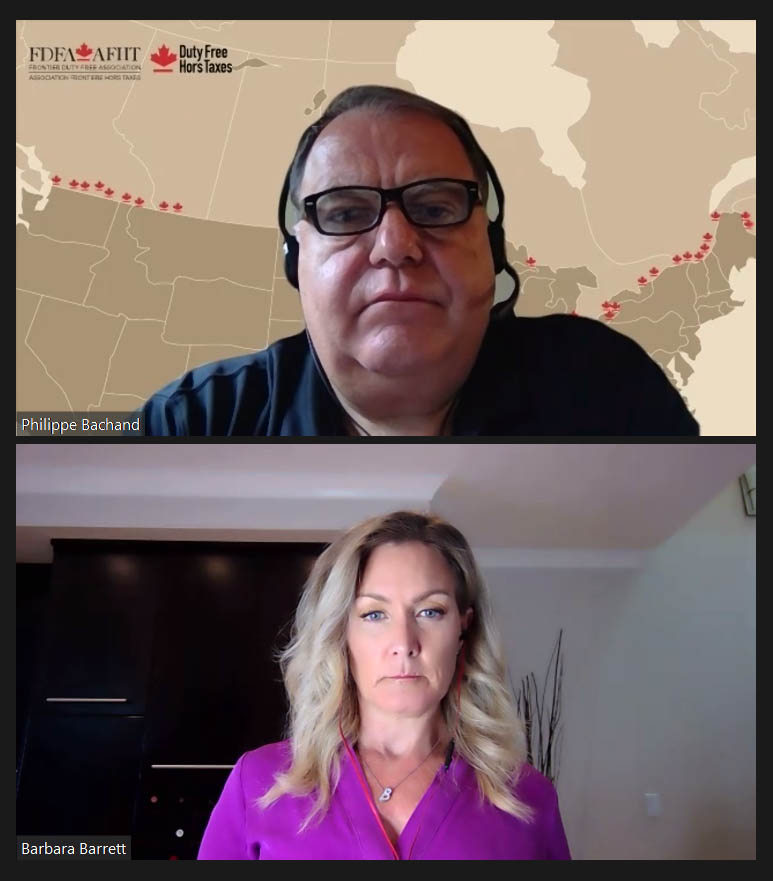With Canada’s land borders with the United States shut down for all but essential traffic for more than 16 months and business in the country’s duty free stores down more than 95%, Canada’s Frontier Duty Free Association is desperately petitioning the federal government for some relief to the crisis resulting from the COVID-19 pandemic.
The Association is calling for C$200,000 for each of its 33 member land border stores, for a total of approximately C$6.6 million; and a modification of restrictions on its export business designation, said FDFA Executive Director Barbara Barrett.
“What business can be closed for 16 months and be expected to survive without additional support?” demanded Barrett during an online press conference on July 7.
Pointing out that the border closures were originally taken to protect Canadian citizens from the spread of the coronavirus, Barrett said that the duty free shops are small, independently owned retail businesses that are an integral part of the border town communities and tourism industries in Canada.
As a highly regulated export business, the shop owners have not been allowed to pivot to other models such as online sales or curbside pickup, or delivery or takeout. Further exacerbating the situation, the duty free operators have hundreds of thousands of dollars of inventory that have reached their expiration limits, products the store owners must destroy without recompense.
Some, but not all, of the stores were able to receive some relief from the Canada Emergency Response Benefit (CERB) and Canada Emergency Wage Subsidy (CEWS) programs, but these are winding down as of this week, said Barrett and Philippe Bachand, Board Member and owner of the Philipsburg Duty Free Shop in Quebec. Bachand said that without tourism, his stores are seeing only 2% of its normal business during the border shutdown.
“We are keenly aware that if our business in one of the most devastated sectors falls victim to the timing of CEWS and CERB withdrawal. We, along with the entire tourism industry, will be decimated and may never fully recover,” said Barrett.

The FDFA is specifically asking the government for two forms of relief.
- A share of the new tourism relief fund. Canada’s 2021 Budget includes a C$500 million Tourism Relief Fund. The FDFA is asking for a $200,000 per store grant program for each store, for a total of approximately $6.6 million.
“This is a small, but fair, part of this relief…Duty free stores employ thousands of Canadians and keep billions of dollars in revenue in Canada, instead of being lost to the United States duty free store just down the road,” said Barrett. Bachand said the $200,000 would help cover basic operating expenses and salaries.
- FDFA is also asking for Export Designation. Despite being for export only, land border duty free products are subject to domestic policies (ie. such as domestic labelling requirements not necessary on exported products). This puts the stores at a competitive disadvantage with the U.S. duty free and retailers and ultimately results in significant revenue loss. FDFA says that it is critical to the recovery and competitiveness of a vibrant Canadian duty free industry that it be treated as export only and given export designation.
Barrett said that being released from these policies would allow the duty free shops to recover faster.
Relief may not be easy to win. In response to a question, Bachand explained that the Tourism Relief Fund is currently not available for retailers. “And as we are retailers, even though we are 100% touristic, that is a problem,” he said.
Bachand added that the Association is trying to meet with Tourism Minister Mélanie Joly to rectify this, and try to get “our very small share – in order to survive.”
“We fall through the cracks with other programs such as the rent “top-up” because of our unique regulated business model. And we have taken on significant debt to survive this long, but still have no end in sight,” said Barrett.
“Through no fault of our own, but by order of the crown and the border closure, our businesses, without exaggeration, are in critical condition. As long as the government keeps the land border closed, we cannot do our business and we are asking to be able to survive to have a future.”
“Our retailers and their employees did not make business mistakes or plan badly but we closed to protect Canadians and we deserve not to be left behind and have a 40-year-old export sector killed.
“We were happy to do our part to keep Canadians safe and we are now asking for the government to do its part to help us survive and help revive our future.”
“We are going to fight to survive,” Barrett concludes.









